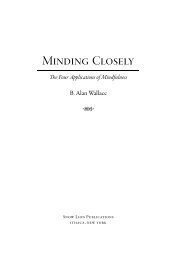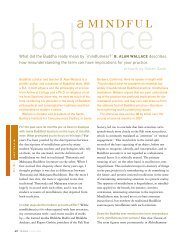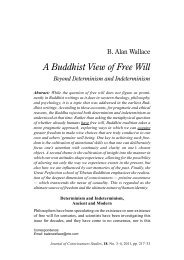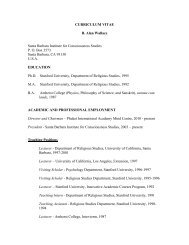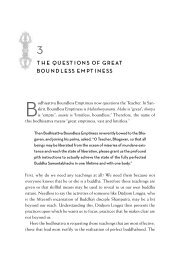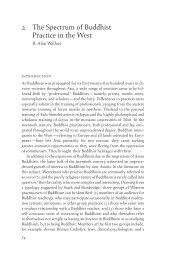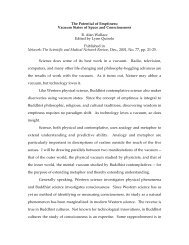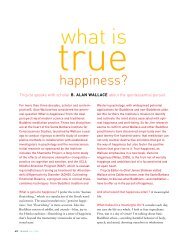“A Science of Consciousness: Buddhism (1), the ... - B. Alan Wallace
“A Science of Consciousness: Buddhism (1), the ... - B. Alan Wallace
“A Science of Consciousness: Buddhism (1), the ... - B. Alan Wallace
Create successful ePaper yourself
Turn your PDF publications into a flip-book with our unique Google optimized e-Paper software.
suffering are to be found within <strong>the</strong> mind, specifically in terms <strong>of</strong> cognitive,<br />
emotional, and attentional imbalances. The third noble truth hypo<strong>the</strong>sizes that<br />
<strong>the</strong>se afflictive tendencies can be irreversibly dispelled from <strong>the</strong> mind. And <strong>the</strong><br />
fourth noble truth presents detailed procedures for collecting data by observing<br />
mental processes and experimenting with techniques for transforming <strong>the</strong> mind<br />
and eliminating its afflictive elements. 26<br />
The very notion <strong>of</strong> observing <strong>the</strong> mind with <strong>the</strong> mind appears problematic<br />
to many thinkers, for it does not allow for <strong>the</strong> separation <strong>of</strong> subject and object<br />
that characterizes o<strong>the</strong>r kinds <strong>of</strong> scientific observations. This is a legitimate<br />
concern. Is it even possible to observe mental states and processes with <strong>the</strong><br />
mind? Even with no mental training, we can detect our emotional states, we can<br />
observe thoughts and images arising in <strong>the</strong> mind, and we can introspectively<br />
recognize from moment to moment whe<strong>the</strong>r our minds are calm or agitated. On<br />
a more basic level, we can perceive that we are conscious—we are aware not only<br />
<strong>of</strong> objects <strong>of</strong> consciousness but <strong>of</strong> <strong>the</strong> presence <strong>of</strong> our own consciousness <strong>of</strong> o<strong>the</strong>r<br />
things. 27 And this faculty <strong>of</strong> mental perception is <strong>the</strong> only instrument we have for<br />
directly observing any mental phenomena. While it is true in this case that <strong>the</strong>re<br />
is no absolute separation between <strong>the</strong> instrument <strong>of</strong> observation and <strong>the</strong><br />
observed phenomena, this fact does not necessarily ban <strong>the</strong> whole procedure<br />
from <strong>the</strong> realm <strong>of</strong> scientific exploration. After all, <strong>the</strong> inextricable relation<br />
between <strong>the</strong> system <strong>of</strong> measurement and <strong>the</strong> measured phenomena is a familiar<br />
19



